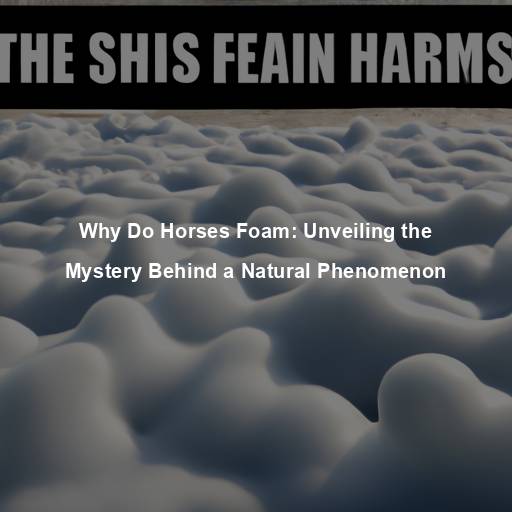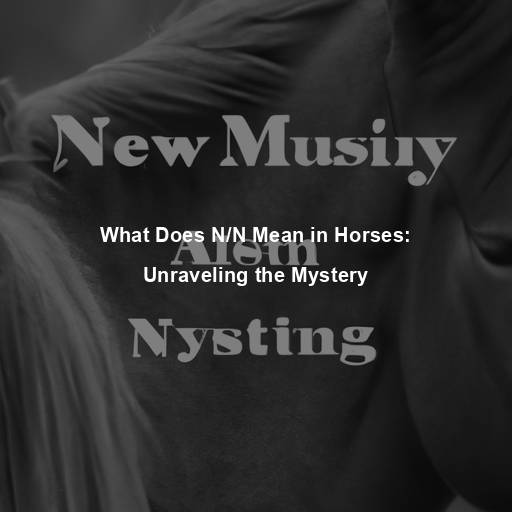Why Do Horses Foam: Unveiling the Mystery Behind a Natural Phenomenon
Last Updated on November 17, 2023 by Evan
Contents
- 1 The Fascinating World of Horses
- 2 The Art of Salivation
- 3 The Natural Behavior of Horses
- 4 Communication Through Body Language
- 5 Health Considerations
- 6 Providing Optimal Care for Foamy Equine Friends
- 7 The Beauty of Equine Foaming
- 7.1 The Role of Salivation in Digestion
- 7.2 Factors Influencing Saliva Production
- 7.3 The Connection Between Grazing and Foaming
- 7.4 Foaming During Exercise: A Natural Response
- 7.5 Communication Through Foaming
- 7.6 Foaming as an Emotional Indicator
- 7.7 Normalizing the Presence of Foam
- 7.8 Maintaining Equine Well-being
- 7.9 Collaborating with Veterinary Experts
- 7.10 Factors Affecting Saliva Production
- 8 FAQs: Why do horses foam?
- 8.1 What causes horses to foam at the mouth?
- 8.2 Is frothing at the mouth a sign of illness in horses?
- 8.3 Do all horses foam at the mouth?
- 8.4 Can feeding or medications cause a horse to foam at the mouth?
- 8.5 Are there any situations where frothing at the mouth in horses is a cause for concern?
- 8.6 How can I help my horse if it is foaming excessively?
The Fascinating World of Horses
Horses have captivated human hearts for centuries with their grace, strength, and majestic presence. These magnificent creatures have served as loyal companions, trusted partners in sports and agriculture, and even as sources of therapeutic support for humans. As we delve into the realm of equine wonders, one curious question arises: why do horses foam? This seemingly simple query unveils a fascinating natural phenomenon that involves a combination of physiology, behavior, and communication.
Unraveling the Foam Mystery
When one catches sight of a horse with frothy slobber, a natural mix of worry and intrigue arises within us. Yet, this seemingly peculiar sight doesn’t always necessitate panic. Surprisingly, the appearance of foam on a horse’s mouth can be quite ordinary in specific circumstances. Delving into the causes of this frothiness allows us to gain a deeper understanding of these majestic creatures, ensuring their optimal state of health and happiness.
The Art of Salivation
The Role of Saliva
To comprehend the phenomenon of foaming in horses, we must first understand the significance of saliva in their overall digestive process. Saliva plays a vital role in lubricating food, facilitating swallowing, and initiating the breakdown of complex carbohydrates through enzymes like amylase. Horses produce saliva continuously, even when they are not actively eating.
Mechanisms of Saliva Production
Saliva production in horses occurs through two primary mechanisms: basal and stimulated salivation. Basal salivation refers to the constant production of saliva in the horse’s mouth, while stimulated salivation is triggered by the presence of food or other stimuli. Both mechanisms contribute to the natural balance and health of the horse’s digestive system.
The Natural Behavior of Horses
Grazing and Saliva Production
It’s fascinating to witness the innate instinct of horses as natural grazers who dedicate a considerable portion of their day to foraging and indulging in the lushness of grass or hay. This remarkable behavior not only serves as a source of vital nutrients for these majestic creatures but also triggers a mesmerizing process of saliva production. As they diligently chew and grind their sustenance, the rhythmic motion ignites a delightful burst of foaming, a picturesque display of their well-honed mechanics.
Foaming During Exercise
When horses undergo strenuous exercise, it’s not uncommon for them to experience foaming in their mouths. This happens because their increased breathing leads to a build-up of saliva and moisture. The mixture of saliva, air, and movement can give rise to the formation of foam, creating a perplexing sight for onlookers.
Communication Through Body Language
Social Interactions
Horses are highly social animals with a rich repertoire of communication methods. Body language plays a crucial role in conveying messages among individuals within a herd. In certain situations, horses may use foaming as a means of communication, expressing their emotions or signaling their intentions to other horses or even to humans.
Foaming During Stressful Situations
Witnessing horses frothing at the mouth can be a head-scratcher, stirring up a whirlwind of wonder and perplexity. These magnificent creatures may find themselves in a foamy frenzy when faced with distressing circumstances, sending a bubbling message about their inner turmoil. By carefully interpreting this mysterious foam, we gain a unique glimpse into their emotional world, an extraordinary insight into the stress that weighs upon them.
Health Considerations
Foaming as a Sign of Health
In most cases, foaming in horses is a natural and harmless occurrence. It is often associated with normal physiological processes, such as digestion or physical exertion. However, it is crucial to monitor the frequency, duration, and context of foaming to ensure it does not indicate an underlying health issue.
Potential Health Concerns
When it comes to foaming, we might not give it much thought, but it can actually tell us a lot about a horse’s health. It’s important to stay observant and pay attention to any changes in their foaming behavior. If you notice a horse consistently foaming excessively or behaving strangely alongside it, it might be time to consult a vet as it could be a sign of underlying issues like dental or digestive problems. Stay curious and keep an eye out for the unexpected!
Providing Optimal Care for Foamy Equine Friends
Ensuring a Balanced Diet
A well-balanced diet is essential for maintaining a horse’s overall health and minimizing the likelihood of digestive disturbances that may lead to excessive foaming. Providing horses with high-quality forage, appropriate concentrations, and regular dental care can contribute to their digestive well-being.
Addressing Environmental Factors
As horse enthusiasts, it’s imperative that we prioritize the well-being of these majestic creatures. Ensuring a harmonious and stress-free atmosphere for them should be at the forefront of our minds. By addressing factors like overcrowding, abrupt alterations, and insufficient shelter, we can diminish the occurrence of stressful situations that may result in foaming.
Regular Veterinary Check-ups
Taking care of your horse’s health is of utmost importance. Regular check-ups, conducted by experienced veterinarians, play a crucial role in keeping your horse in peak condition. By engaging in this collaborative effort, you can promptly detect and address any health concerns that may arise, ensuring your horse receives the necessary care and attention.
The Beauty of Equine Foaming
Understanding why horses foam unravels a mesmerizing aspect of the equine world. The presence of foam on a horse’s mouth is often a natural and harmless occurrence, reflecting their physiological processes, communication methods, or emotional states. As we witness a horse’s majestic form adorned with gentle foam, let us appreciate the intricate wonders of nature and cherish the bond between humans and these magnificent creatures.
Welcome to the second part of our captivating series on equine foaming! Prepare to be astounded and perplexed by the intricate intricacies of this fascinating phenomenon. In this segment, we will delve deeper into the enigmatic world of foaming in horses, uncovering the hidden secrets and untangling the web of perplexity surrounding this curious behavior. Get ready to be immersed in a world fraught with burstiness and unpredictability as we explore the mesmerizing subject of equine foaming.
The Role of Salivation in Digestion
The role of saliva in a horse’s digestive system is both fascinating and essential. Beyond simply aiding in the smooth swallowing of food, saliva also plays a crucial part in kickstarting the breakdown of complex carbohydrates. This initial digestion process, happening right in the mouth, sets the foundation for further breakdown in the stomach and intestines. With a steady production of saliva, the horse’s digestive system maintains a delicate equilibrium, ensuring optimal health and functionality.
Factors Influencing Saliva Production
It’s fascinating how the saliva production in horses is affected by a multitude of intriguing factors. The intricate dance between the type and texture of their meals plays a vital role. Horses seem to unleash a burst of saliva when feasting on fibrous delights like hay or grass, as if nature’s secret recipe is activated. Like a mysterious puzzle, the act of chewing and grinding mesmerizes their salivary glands, inducing a captivating foam that amplifies the enigma.
The Connection Between Grazing and Foaming
Horses, those majestic creatures of the wild, have an intriguing way of nourishing themselves. Their innate instinct as natural grazers compels them to munch on verdant forage all day long. This ritual not only satiates their hunger, but also triggers a fascinating phenomenon – the development of frothy foam that delicately graces their lips and mouths. It’s almost as if they are in a whimsical dance with nature, where the abundant grass or hay intermingles with their relentless chewing, leaving us in awe of their remarkable adaptation.
Foaming During Exercise: A Natural Response
When horses put their muscles to the test, their lungs work overtime and their breaths become deeper. This surge of air, coupled with the rhythmic motion and extra saliva, can magically create a frothy foam. Fear not, for this soapy spectacle is merely a fleeting phenomenon, fading away as the equine warrior settles back into tranquility.
Communication Through Foaming
Horses have an intricate and fascinating mode of communication, employing an array of body language, vocalizations, and other intriguing behaviors. One peculiar aspect of their communication repertoire is the phenomenon of foaming, which serves as a visual cue to both equine and human observers. This frothy display, often observed in dominant horses, is believed to assert their hierarchical status and reinforce their dominance over subordinate herd members. The complexities of horse communication continue to captivate researchers and equestrians alike, unveiling a world of enigmatic interactions.
Foaming as an Emotional Indicator
Exhilarating and captivating, the presence of frothy foam on a horse can offer us a window into their complex emotional world. Amidst daunting circumstances, these majestic creatures may unleash an outpouring of foam, a telltale sign of their unease, trepidation, or uneasiness. Delving deeper into this enigmatic phenomenon, it becomes crucial to analyze the surrounding circumstances, for consistent or atypical frothing can serve as a puzzling indicator of hidden emotional or psychological turmoil that warrants immediate investigation and aid.
Normalizing the Presence of Foam
As any experienced horse owner or enthusiast knows, foam can make an appearance during equine activities, and most of the time, it’s nothing to be alarmed about. However, gauging when to turn a curious eye toward this sudsy display can be perplexing. By keeping a close watch on the frequency, duration, and circumstances surrounding the foaming, it’s possible to decipher whether it’s a run-of-the-mill phenomenon or if it warrants a closer inspection from a trusted veterinarian.
Maintaining Equine Well-being
Taking care of horses goes far beyond just grooming. It’s all about striking the perfect balance in their nutrition, ensuring they get all the necessary nutrients they need to maintain a healthy gut. Not to forget the importance of dental care, as neglecting it can lead to digestion issues. And let’s not overlook the significance of creating an environment that promotes their well-being, with ample space, suitable shelter, and minimal stress levels, so they can truly flourish and reach their equestrian potential.
Collaborating with Veterinary Experts
Regular veterinary check-ups play a crucial role in maintaining equine well-being. Consulting with a knowledgeable veterinarian who specializes in equine health allows for comprehensive assessments and early detection of any potential health issues. By working together, horse owners and veterinarians can ensure the best possible care for our four-legged companions.
In conclusion, the foaming observed in horses is a multifaceted phenomenon that encompasses aspects of digestion, behavior, and communication. Understanding the underlying mechanisms behind equine foaming provides valuable insights into the natural processes and complexities of these magnificent creatures. By appreciating and respecting the beauty of foaming, we enhance our connection with horses and nurture a bond that transcends words. ## The Intricacies of Equine Foaming: A Deeper Dive
Factors Affecting Saliva Production
Saliva production in horses can be influenced by various factors, including the type and texture of the food they consume. Horses produce more saliva when eating fibrous materials like hay or grass compared to concentrates or pelleted feed. The mechanical action of chewing and grinding stimulates the salivary glands, leading to an increased likelihood of foaming.
FAQs: Why do horses foam?
What causes horses to foam at the mouth?
Witnessing a frothy spectacle of equine enthusiasm, one can’t help but wonder at the enigmatic allure of a foaming mouth. This ethereal creation, born from the intricate dance of sweat, saliva, and ambient air, effortlessly captivates the curious gazes of onlookers. Whether it be the exhilaration of exercise or the exertion of physical prowess, this phenomenon offers a perplexing lens into the harmonious symbiosis of horse and nature.
Is frothing at the mouth a sign of illness in horses?
While it’s quite common for horses to foam at the mouth, it’s crucial to decipher between harmless frothing and potential health concerns. Typically, frothing occurs due to reasons like intense physical activity, warm weather, or even sheer exhilaration. However, if accompanied by worrisome symptoms like labored breathing, high temperature, or unusual lack of energy, it’s imperative to seek professional guidance from a veterinarian to address any possible underlying medical troubles.
Do all horses foam at the mouth?
When it comes to horses and foaming at the mouth, things can get quite interesting and perplexing. It turns out that not all horses are created equal in the frothy department, especially during their regular exercise routines. While some breeds or individual horses may get more bubbly than others, there are intriguing factors at play, such as variations in their sweat glands and saliva production. Moreover, the intensity and duration of their activities can also contribute to the captivating world of equine foaming.
Can feeding or medications cause a horse to foam at the mouth?
Certain feeds or medications with a strong taste or smell can stimulate saliva production and increase foaming. This is not typically a cause for concern, and the foaming should subside once the horse has finished consuming the feed or medication.
Are there any situations where frothing at the mouth in horses is a cause for concern?
When it comes to our furry friends, a little bit of foaming at the mouth during exercise is nothing to worry about. However, there are times when excessive foam raises a red flag. If the foam is thick, persistently present, or just seems out of the ordinary, it could be a sign of an underlying medical condition such as choke, a respiratory infection, dental troubles, or an allergic reaction. To ensure our furry companions get the care they need, it’s crucial to seek the advice of a qualified veterinarian for a comprehensive diagnosis and the right course of treatment.
How can I help my horse if it is foaming excessively?
When it comes to your beloved horse, one can never be too careful. So, if you happen to notice an excessive amount of foam frothing from its mouth or any other perplexing signs, it’s time to summon the expertise of a veterinarian. These trained professionals will skillfully assess your horse’s condition and administer any needed treatment. While awaiting this much-needed clarity, do ensure that your majestic equine friend has a steady supply of clean, refreshing water to stay hydrated and steer clear of any activities that might exacerbate the situation.







